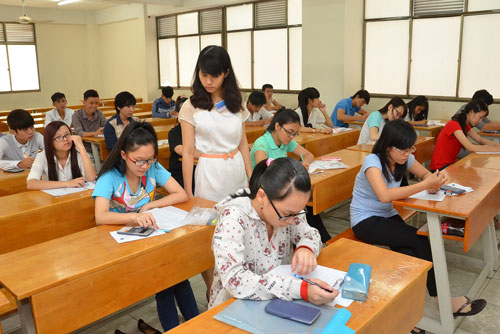

The regulation, issued on October 17 by the Ministry of Education and Training, stipulates that students who satisfy one of two requirements will not have to sit the foreign-language exam in the 2015 finals.
If a student has participated in an international Olympiad in foreign languages, or possesses an international certificate in foreign language (valid up to June 9, 2015, the day of the final exam), they will be exempt from taking the foreign-language test.
As for English certificates, students must have either a 400 score on TOEFL ITP, a 32 on TOEFL iBT, a 400 on TOEIC (granted by the Educational Testing Service, ETS) or a 3.5 on IELTS (granted by ETS, British Council, IDP Education).
The MOET regulation, for the near future, says that foreign-language exam questions will be designed in a way to test the capability of students who have studied foreign languages for seven years.
The test questions will be at the level of the second grade in the Vietnamese six-grade system, or the A2 level in the European framework.
In following years, when a new 10-year general education system will be applied in Vietnam, the exam questions will reflect the level of the third grade, or B1 level in the European scheme.
Nguyen Long Son, president of the Saigon Practice School, while praising the MOET’s decision as it helps ease pressure on students (they will have three instead of four university-entrance exam subjects), fears the policy cannot be implemented.
“How would students’ English skills be assessed if they are based on so many different assessment schemes?” a teacher of English said. “MOET has not set up a ‘conversion rate’ for the certificates.”
The teacher said that MOET’s regulation could face opposition from students in rural and remote areas, because it would seem unfair to them.
“Students in cities and urban areas have better conditions to learn foreign languages,” he explained.
The heads of universities and junior colleges have also expressed concerns about the implementation of the MOET’s new regulation.
“MOET should clearly stipulate what a TOEFL ITP 400 score means, and what marks in the Vietnamese marking scheme are equivalent to this,” he said.
Le Thi Thu Thuy, head of the training division of Hanoi Foreign Trade University, said that if MOET did not create such “conversion rates”, the school would have to consider the students’ marks on finals in making its enrollment decisions.






- Hanoi launches pilot project to integrate electronic health records into VNeID app
- Empowering new generation of biodiversity champions in Vietnam
- Capital Law to make Hanoi major center for quality education
- Hanoi raises road safety awareness among students
- Hanoi pilots artificial intelligence in five schools
- Modern pediatric hospital opens in Hanoi
